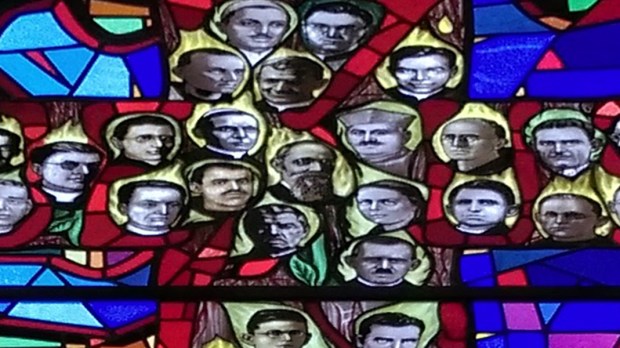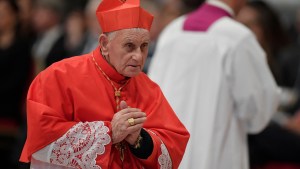The martyrdom of two Albanians who died for their faith during the first quarter of the 20th century was recognized June 20, 2024. Their recognition as martyrs paves the way for their beatification.
At the same time, there were four decrees recognizing the “heroic virtues” of various Europeans.
During an audience with the prefect of the Dicastery for Causes of Saints, Cardinal Marcello Semeraro, the Pope authorized recognition of the martyrdom of the Franciscan priest Luigj Palić. Born into a Catholic family in Janjevo, Kosovo, on February 20, 1877, he was exposed to dialogue with other religions from an early age, growing up in a predominantly Muslim community.
Like two of his brothers, he joined the Franciscan order, entering the novitiate at Cortemaggiore in Italy at the age of 19. He took his religious vows on April 26, 1901, and was ordained a priest the following September.
The young Franciscan was then sent to his native country, where he was appointed rector of the Franciscan convent in Gjakova. In 1912, he was sent to work with the parish of Peje, in a territory occupied by the Montenegrins following the First Balkan War.
Under occupation, Albanian Catholics and Muslims were subjected to a campaign of forced conversion to Orthodoxy. In this context, despite the risks involved, Father Palić urged the inhabitants to remain faithful to their beliefs, explains the website of the dicastery for the Causes of Saints.
Arrested on March 4, 1913, the Franciscan was taken to prison, where he was beaten and tortured. He was killed on March 7 by Montenegrin soldiers, without being brought to trial.
A second Albanian priest martyred
The Dicastery for the Causes of Saints has also published the decree of martyrdom of the priest Gjon Gazulli, born in Dajc, Albania, on March 26, 1893. He entered the Scutari seminary at the age of 12, was ordained a priest in 1919 and served as parish priest in various parishes.
His ministry was appreciated by all, but his initiatives – notably the creation of a parish school to teach Catholic religion – worried the authoritarian regime of President Ahmet Zogu. While many priests left Albania, Father Gazulli chose to remain among his people.
Accused of obstructing the joint education of Muslims and Christians, he was arrested on December 28, 1926. In prison, he remained faithful to his faith despite torture and harassment. After a sham trial, he was found guilty on false charges and hanged in Scutari Square on March 5, 1927. His reputation as a martyr spread rapidly, even among non-Catholics.
4 Venerables
Pope Francis also authorized the dicastery to promulgate decrees recognizing the “heroic virtue” of four Servants of God.
They include Franciscan friar Isaia Columbro (1908-2004), born in the Italian region of Campania. He joined the Friars Minor and was ordained a priest in 1931. Many of the faithful came to him for advice and to receive the sacrament of confession.
Close to the poor, he celebrated his 50th anniversary of priesthood with people displaced by the devastating 1980 earthquake in the Irpina region.
Isaia Columbro “embodied the Franciscan ideal of a life mingled with a spirit of service, simplicity, humility and constant self-giving,” notes the Dicastery for the Causes of Saints.
Another Italian also became “venerable”: the nun Maria Costanza Zauli (1886-1954). Having entered religious life at the age of 19, she fell ill in the 1920s and had to remain bedridden. Still, she dreamed of founding a religious community dedicated to Eucharistic adoration, to pray for the conversion of the world, vocations and the unity of the Church. The Congregation of the Servant Adorers of the Blessed Sacrament was founded in 1933. After spending the rest of her life at the convent in Bologna, Maria Costanza Zauli died there on April 28, 1954.
A Spaniard from the Toledo region, Ascensión Sacramento Sánchez Sánchez was also recognized as venerable. After reading the life of St. Theresa of the Child Jesus, she decided to become involved in evangelization, particularly through Catholic Action.
During the Spanish Civil War, she lost two brothers and witnessed Republican violence against churches. It was in Santander that she met Father Doroteo Hernández Vera, who in 1937 founded the “Evangelical Crusade” to combat religious hatred. Involved in this movement, she ran a home in Madrid for women released from prison. Stricken by typhoid fever in 1946, she died at the age of 35.
Finally, the list includes the heroic virtue of Spanish nun Vicenta Guilarte Alonso, a missionary in Brazil whose life was marked by service and obedience. Born on January 21, 1879, in the province of Burgos, Spain, she entered the Daughters of Jesus to devote herself to the education of youth.
After making her religious profession in 1909, she was sent with five sisters to Brazil to found a community in Pirenopolis. After serving as vice-superior, in 1927 she was transferred to Leopoldina, where she was entrusted with the role of doorkeeper and sacristan. Humbly accepting this role, she devoted herself to welcoming visitors, acquiring a reputation for holiness that earned her the title of “Saint of the College.” She died at the age of 71 on July 6, 1960, after fracturing her femur.



